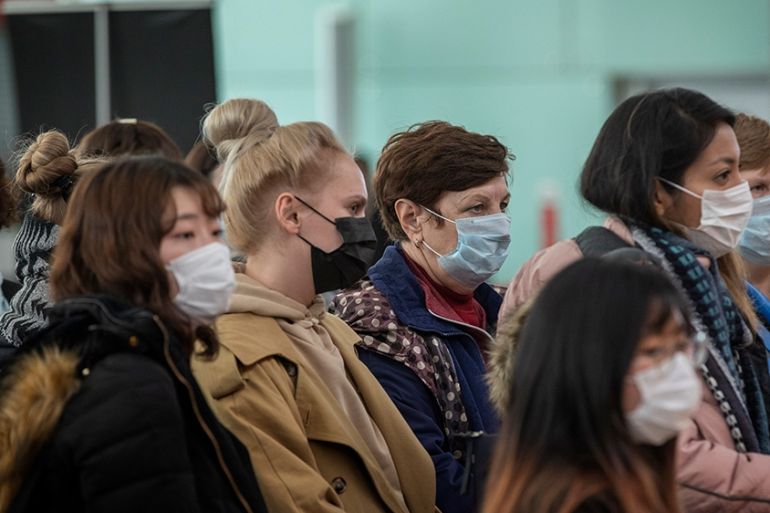Australia and New Zealand’s central banks join coronavirus fight
The Reserve Bank of Australia pumped $3.6bn into markets and New Zealand’s central bank cut rates after US move.

Australia, New Zealand and South Korea on Monday were the latest countries to see their central banks taking measures to help their economies fight the effects of the coronavirus pandemic.
The moves follow a shock rate cut by the United States Federal Reserve on Sunday, which lowered interest rates to near zero in another emergency move to help shore up the US economy as the outbreak derails trade, tourism and domestic production.
Keep reading
list of 3 itemsCash bonanza: Central banks pump economies with emergency funds
Coronavirus highlights lack of safety net for gig workers
Australia‘s central bank, the Reserve Bank of Australia, poured $3.6bn in liquidity into Australia‘s financial system and said it was prepared to buy government bonds, while the Reserve Bank of New Zealand (RBNZ) slashed interest rates by three-quarters of a percentage point to a record low on Monday following an emergency meeting.
Currencies of both countries sank following the moves, with the Australian dollar down 0.5 percent to $0.6163 while the New Zealand dollar falling 0.3 percent to $0.6040.
“The Reserve Bank stands ready to purchase Australian government bonds in the secondary market to support the smooth functioning of that market, which is a key pricing benchmark for the Australian financial system,” Governor Philip Lowe said in a two-paragraph statement on Monday.
RBNZ also cut its official cash rate (OCR) to 0.25 percent, and pledged to keep it at this level for at least 12 months, the banks said in its statement.
In South Korea, the central bank cut its benchmark interest rate by 50 basis points in a rare inter-meeting rate.
The Bank of Korea has not made a cut through an emergency policy meeting since October 2008, when Asia’s fourth largest economy was reeling from the global financial crisis.
The Bank of Korea’s policy board cut the base rate to 0.75 percent, the lowest since the bank adopted the current policy system in 1999, a media official said in a text message. The central bank cut rates in July and October last year.
RBNZ Governor Adrian Orr told a media conference the virus was expected to have a severe effect on New Zealand’s people and economy over the coming year.
But he said the move was also meant to show that the RBNZ was not at this point contemplating negative interest rates, even as the policy options for central banks dwindle globally.
“If a further stimulus was necessary at some point, which is not the case at the moment, we would consider using our additional tools, for example, large-scale asset purchases of New Zealand government bonds,” Orr said at a news conference after the rate cut decision.
“Not all banks are ready for negative interest rates,” he said, adding that commercial banks were not asking for more liquidity.
Meanwhile, Australia‘s corporate regulator asked some participants in the equity market to reduce the number of trades they execute each day by up to 25 percent after a huge spike in volumes last week.
Australia has recorded nearly 300 cases of coronavirus and at least five deaths.
The moves, however, did little to calm market jitters, with the local share market falling as much as 7 percent in morning trading.
The rate cut and virus measures also shook New Zealand’s corporate sector, with a number of companies suspending their earnings outlooks.
“Immediate and sizeable action was needed, and it brings the RBNZ into the line with the actions of central banks overseas,” ANZ Bank Chief Economist Sharon Zollner said in a note.
ANZ said RBNZ was likely to implement more unconventional policies as soon as was practicable.
There are so far eight confirmed cases of coronavirus in New Zealand.
Economic effects
New Zealand Prime Minister Jacinda Ardern announced tough new measures on Saturday to protect the country against the virus by ordering everyone entering the country to self-isolate.
Orr said negative economic implications of the COVID-19 virus are becoming clearer and more significant.
“Global trade, travel and business and consumer spending have been curtailed significantly,” he added.
He, however, said New Zealand’s financial system remains sound and important financial institutions are well capitalised and liquid.
The government plans to announce an economic stimulus package on Tuesday.
Orr said he expects the effect of the outbreak will lead to some business failures and some unemployment, adding that in some scenarios he sees the economy going into recession.
“It would harm a number of people in the New Zealand economy,” he said.
RBNZ said it would also delay the start date of increased capital requirements for banks by 12 months to July 1 next year.